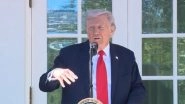Islamabad, Feb 17 (PTI) Pakistan Prime Minister Imran Khan on Monday urged the UN to fulfil its commitments with the people of Kashmir and help them achieve right of self-determination as he met chief of the global body Antonio Guterres here.
During his meeting with the UN Secretary-General, Prime Minister Khan highlighted the "dire human rights and humanitarian situation" in Jammu and Kashmir following India's August 5 decision to end the special status of the region.
"The Prime Minister underscored that the Kashmiri people continued to look to the United Nations to honour its commitments for the realisation of their right to self-determination, as enshrined in numerous UN Security Council resolutions," the Prime Minister's Office said in a statement.
Tensions between India and Pakistan spiked after New Delhi ended the special status of Jammu and Kashmir on August 5 last year. India's decision evoked strong reactions from Pakistan, which downgraded its diplomatic ties and expelled the Indian envoy.
India has defended its move, saying the special status provisions only gave rise to terrorism in Jammu and Kashmir.
"The country took the decision of abrogation of Article 370, which had only given separatism and terrorism to that state," Prime Minister Narendra Modi said in October last year.
India has rejected any third party intervention to the Kashmir issue and has maintained that all outstanding matters in Indo-Pak ties should be resolved bilaterally.
Khan claimed that India's belligerent rhetoric, intensified ceasefire violations on the LoC, and other aggressive actions were imperiling peace and security in the region, the statement said.
He also highlighted the possibility of a false flag operation by India to divert global attention from its "unacceptable actions" in Kashmir, it said.
Talking about Afghanistan, Khan underscored that there was no military solution to the Afghan conflict and reaffirmed Pakistan's steadfast support for peace and reconciliation in the war-torn country.
Khan also highlighted Pakistan's generosity in hosting millions of Afghan refugees for the last four decades, the statement said.
Earlier, Guterres and Khan attended the International Conference on 40 years of hosting Afghan refugees in Pakistan.
The Prime Minister also stressed that climate change posed an existential threat to mankind and assured the Secretary General that Pakistan would work hand in hand with the global community to pursue swift implementation of the Paris Climate Agreement.
He also highlighted the landmark '10 billion Tree Tsunami'.
Guterres also held talks with Pakistan Army chief General Qamar Javed Bajwa on Monday.
Matters of mutual interests, overall regional security situation including Afghan refugees issue, Afghan reconciliation process and the Kashmir dispute were discussed during the meeting, Pakistan army said in a statement.
"Visiting dignitary said that there is a need to implement UN resolutions on Kashmir," the statement said.
The UN chief on Sunday arrived on a four-day visit to Pakistan during which he will also visit Gurdwara Kartarpur Sahib.
Guterres thanked Pakistan for "full access given to United Nations Military Observer Group in India and Pakistan (UNMOGIP) in Kashmir," it said.
He also commended the improved security situation in Pakistan and positive efforts towards regional peace and stability.
The UN chief also acknowledged Pakistan's contribution in UN peacekeeping missions and extraordinary achievements in counter terrorism.
Separately, United States special envoy for Afghan reconciliation ambassador Zalmay Khalilzad also called on General Bajwa, the statement said.
"During the meeting, matters of mutual interest including overall regional security situation and ongoing Afghan reconciliation process were discussed," it said.
Khalilzad was in Pakistan to attend the conference on Afghan refugees and discuss the Afghan peace process. He also met Prime Minister Khan.
(The above story is verified and authored by Press Trust of India (PTI) staff. PTI, India’s premier news agency, employs more than 400 journalists and 500 stringers to cover almost every district and small town in India.. The views appearing in the above post do not reflect the opinions of LatestLY)













 Quickly
Quickly


